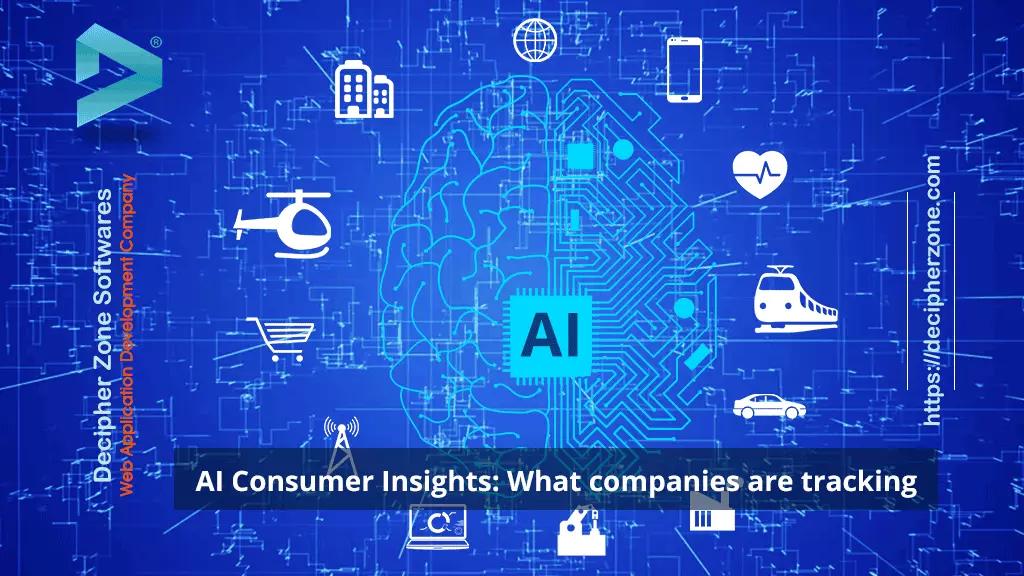Artificial Intelligence is an ongoing trend which is hyped a lot but the perception of people is positive as well as negative. People are quite sceptical about the fact that AI can pose a threat to humans and their privacy which really depends on how we use AI.
AI Consumer Insights
The fact that companies are tracking people’s activity to create targeted ads for more ROI (Return on investment) and it does not pose any threat to our privacy because the data is being shared with hidden identities. So, let’s discuss how, why & what companies are tracking about us.
Which are the mediums that are being used to track users?
Mobile phones, browsing activity and city-wide CCTV cameras are being used to track user activities, the level of tracking really depends on the geographical location where you live in. The traffic signals of some cities are being connected through sensor nods to centralized servers which will be used to manually monitor and controlled through control rooms but in the later stages, these control rooms will be handled autonomously by Artificially intelligent assistants.
Why & What companies are tracking?
Companies are tracking through every possible resource they could so let us shed light upon some of the resources and how they are using it.
Browsing Activity
The use of Online browsing activity to show targeted ads is a proven technology that has brought more customers to businesses. The major platforms that offer targeted ads are Google, Facebook, Twitter, Instagram, Amazon, Alibaba & many others. If you haven’t noticed the power of targeted ads then just open an item on amazon add it to your cart or Wishlist soon you will realize the online ads that you are getting is mostly about the product that is in your Wishlist or cart.
CCTV cameras
CCTV cameras are being used with Optical character recognition technology to impose fines on traffic rule breakers and controlling traffic through centralized control rooms. South Korean capital Seoul’s city traffic is controlled through CCTV cameras where the city authorities divert the traffic to low-density traffic routes, they also send notification on the city’s website about constructions and accidents.
Read here: Godfathers of Artificial Intelligence
The offline stores from e-commerce giants Alibaba and Amazon uses CCTV cameras to generate the bill automatically when a customer picks up anything in the store which will cut short the queues on cash counters as they can be turned in to self-checkout counters. The AI modules where camera’s feed is being sent is not only used to recognize the objects you picked but also to send targeted ads. The AI module can relate the cashless payment methods that you used with e-commerce giant’s online platforms and physical stores, the products you seem to be interested but didn’t buy them will be shown to you in the targeted ads.
Read here: Latest Artificial Intelligence Trends 2019
China has the highest level of user activity tracking as the Chinese government has launched a social grading system. Ali Pay and WeChat are the prominent e-wallets in China which can even process the payments through facial recognition which has boosted the online transactions to a record high that it is hard to find people who carry cash in China.
Mobile phones
The GPS and other sensors in your phone are used by apps to gather data. Most of these apps are free therefore, they make money out of selling your data to companies without revealing your identity. Tremendous amounts of data are shared by these apps to companies but the question arises what are they going to use it for?
Read here: Future of Artificial Intelligence: The Fourth Industrial Revolution
The answer is to track your offline activity for targeted ads. One such company who is buying the data from these companies is Cosmos. In an interview with CNBC, the company’s representative told that the company needs to map a shop at first and their AI module can provide the data for targeting customers online who left the store without buying the products in which they were interested. The AI module couples the data gathered from location tracking apps with GPS data to know where you spent most of the time in the store to know the product in which you were interested in. The representative said the accuracy is high enough to locate customers’ location within 6 feet because the company is buying data from 450000 apps which cannot be wrong for every app and they are associated with 100000 offline stores already. The company has proven its value to global brands like Loreal to get more ROI (Return on Investment).

